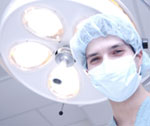VOA慢速英语 2008 0514a(在线收听)
Health Report - Need Your Appendix Out? Let Me Reach Down Your Throat
Researchers test ways to remove diseased organs through the body's natural openings. Transcript of radio broadcast:
13 May 2008
This is the VOA Special English Health Report.  Medical researchers keep looking for less invasive ways to perform operations. The aim is to cut less and to reduce pain and recovery time. Some researchers see a future in NOTES. NOTES is short for Natural Orifice Translumenal Endoscopic Surgery.
Medical researchers keep looking for less invasive ways to perform operations. The aim is to cut less and to reduce pain and recovery time. Some researchers see a future in NOTES. NOTES is short for Natural Orifice Translumenal Endoscopic Surgery.
In simple terms, what this means is the removal of diseased organs through the body's natural openings. For example, a man in California recently had his appendix removed through his mouth.
Twenty-five years ago, having your appendix removed meant staying in the hospital for as long as a week. Patients returned home with an ugly and permanent scar on their abdomen.
But since the late nineteen eighties, laparoscopic surgery has gained popularity. It leaves only small marks where holes were made in the skin. The doctor works with a system called a laparoscope, usually connected to a video camera. Laparoscopic surgery rarely requires a hospital stay.
With the newest kind of surgery, doctors make a small cut in the patient's belly button. A camera is placed through the hole to help guide the surgical instrument.
 |
| Doctor Santiago Horgan |
The operation at the University of California San Diego Medical Center in March lasted three hours. It was done as part of a study to test new methods of minimally invasive surgery. Santiago Horgan, director of UC San Diego's Center for the Future of Surgery, led the medical team.
Doctors used a long robotic tube to pass the instrument down the patient's throat. Then they made a cut in the wall of the stomach. The cut was made to pass the instrument through to the appendix for removal.
The researchers said they believed it was the country's first removal of a diseased appendix through the mouth. They said India was the only other country to report such an operation.
The patient in California, named Jeff Scholz, said he recovered quickly and with little pain.
But some doctors say they are not sure this kind of surgery is worth the possible risks. They say stomach fluids could leak if the hole in the stomach wall is not closed completely. A mistake, they say, could be life-threatening.
The surgical method is still being studied to see if it is better than traditional surgeries.
And that's the VOA Special English Health Report, written by Brianna Blake. Archives of transcripts and MP3s of our reports can be found at voaspialenglish.com. I'm Steve Ember.